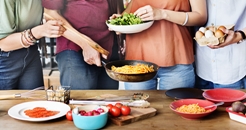 Empathy not sympathy
Empathy not sympathy
From a blog by Nuture Development
Following on from the articles on this site about Church of the table and Empty-handed ministers, I found this excerpt from a Nuture Development blog thought provoking and helpful.
"The world needs more collective empathy, and so, needs the rituals and practices that call it forth. But what we’re getting instead is sympathy. While empathy binds the ingredients that provide us with the sustenance, and the energy to be productive. Sympathy divides us and turns us into consumers. It divides the helper and the helped, the haves and have-nots, the good guys and the bad and the needed and so-called needy.
"There is a simple way to assess whether you are practicing sympathy or empathy.
"Sympathy means the helper doesn’t need anything from those whom they help. Empathy inverts this, creating a bond of interdependence between both parties. The helper needs the helped as much as the helped needs the helper. Those who practice empathy understand their liberation is intertwined with others, and so they move beyond classic helping into a shared pursuit towards liberation.
"Empathy invites people who have been labeled as ‘needy’, back into community life because their gifts are needed and because we need them. Sympathy has the effect of creating dependence between those viewed by some as ‘the needy’ and the ‘needed’. Often at the expense of interdependence at the center of community life.
"Sympathy creates soup kitchens, empathy creates community kitchens, where the harvests of local foods are prepared by neighbours: where everyone’s gifts are needed to create the feast. In the community kitchen, you can’t tell the difference between the helper and helped because they are interdependent. The person labeled as homeless, is actually the chef and there, is as worthy and as needed as the middle class volunteer eager to help. It is in this space that together they practice community. And it is there that they get better at being human together.
"It is in this space they may begin to ask about the issues in the community and think up ideas and solutions which involve each other."
In creating soup kitchens, foodbanks, etc., have we missed a vital ingredient - the involvement and gifts of those we see as needing help?
Retweet about this article:
From a blog by Nuture Development, 15/05/2018